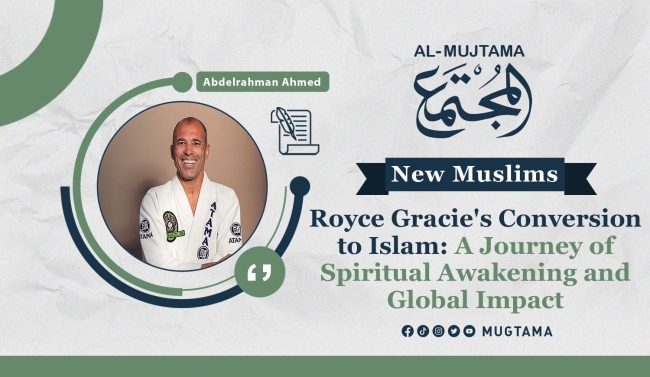Royce Gracie's Conversion to Islam: A Journey of Spiritual Awakening and Global Impact
Introduction:
In the world of martial arts, few names resonate as profoundly as Royce Gracie. Renowned for his pioneering contributions to Brazilian Jiu-Jitsu (BJJ) and Mixed Martial Arts (MMA), Gracie's legacy is one of skill, resilience, and innovation. However, beyond his accomplishments within the octagon, Gracie's recent decision to convert to Islam has sparked widespread interest and reflection. This essay explores the journey of Royce Gracie's conversion to Islam, delving into the factors that influenced his decision, its implications on his personal and professional life, and the broader significance it holds within the martial arts community and beyond.
Early Career and Connections to Israel:
Royce Gracie's martial arts journey is intertwined with his interactions with Israel. Throughout his career, he exhibited admiration for Krav Maga, a self-defense system originating from Israel, and engaged in activities promoting Israeli martial arts and military products. His visits to Israel for teaching and training sessions, as well as his association with Israeli figures like Prime Minister Benjamin Netanyahu, showcased his deep ties to Israel's martial arts community.
Controversial Tweet and Turning Point:
Despite his longstanding connections to Israel, Gracie's public support for the country in a controversial tweet marked a turning point in his journey. The tweet, expressing solidarity with Israel during a period of conflict, garnered backlash from some supporters and raised questions about Gracie's stance on geopolitical issues. However, this incident catalyzed deeper introspection and led Gracie to reevaluate his perspectives.
Embracing Islam:
In a surprising twist, Royce Gracie's path took a spiritual turn following a meeting arranged by brother Eddie from The Deen Show, featuring prominent Muslim preacher Shaykh Uthman Ibn Farooq. Despite harboring negative perceptions towards Muslims, Gracie was deeply moved by the sincerity and kindness displayed during the encounter. This encounter ultimately led to his embrace of Islam, marking a profound shift in his worldview and identity.
Implications and Reflections:
Gracie's conversion to Islam carries significant implications for both his personal and professional life. It reflects a journey of spiritual awakening and transformation, as he embraces a new faith and aligns his actions with its principles. His intention to visit the holy city of Mecca and his commitment to Islamic practices such as abstaining from alcohol and pork underscore his dedication to his newfound faith.
Broader Significance:
Beyond the individual journey of Royce Gracie, his conversion to Islam holds broader significance within the martial arts community and society at large. It challenges stereotypes and prejudices, demonstrating the power of dialogue and understanding in bridging cultural and religious divides. Gracie's embrace of Islam serves as a testament to the universality of spiritual seeking and the potential for personal growth and transformation.
Conclusion:
Royce Gracie's conversion to Islam represents a remarkable journey of self-discovery and spiritual evolution. From his early connections to Israel to his unexpected embrace of Islam, Gracie's path is a testament to the complexity of identity and the power of faith to shape one's worldview. His story serves as a reminder of the transformative potential of dialogue, empathy, and open-mindedness in fostering understanding and unity in an increasingly diverse and interconnected world.


